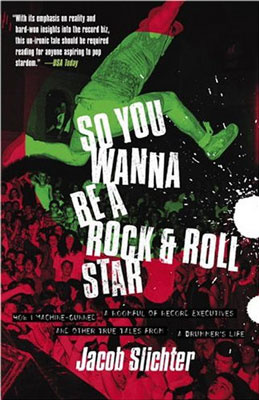Features
The Real School Of Rock
So You Wanna Be A Rock & Roll Star by Jacob Slichter
by Jason Warburg
 What is it about rock and roll drummers? Keith Moon was a genius behind the kit and a self-destructive madman everywhere else. Charlie Watts looks like your kindly uncle and plays jazz like a born master when he's not busy banging out "Satisfaction" for the 79,000th time. In the past ten years Counting Crows has had four hit albums and three drummers.
What is it about rock and roll drummers? Keith Moon was a genius behind the kit and a self-destructive madman everywhere else. Charlie Watts looks like your kindly uncle and plays jazz like a born master when he's not busy banging out "Satisfaction" for the 79,000th time. In the past ten years Counting Crows has had four hit albums and three drummers. And then there's Jacob Slichter, a mild-mannered, occasionally panic-attack-stricken average Joe who went in a matter of five years from being friends with musicians to drumming behind them in small clubs, to riding an exhilarating wave of success, to getting spit back out by the music industry monster, leaving him no choice but to take time off to write one of the wittiest and most entertaining books ever published about life inside the rock and roll bubble.
So You Wanna Be A Rock And Roll Star is the book you or I might write if we were to trade places for five years with someone who had just scored a major-label record deal (and hopefully had some actual musical talent as well). It's a remarkably clear-eyed and self-aware chronicle of a trip through the looking glass of fame and back again. Slichter, drummer for Semisonic (remember "Closing Time"?), chronicles his wild ride with an Everyman mixture of bewilderment and lust (for affirmation, mostly).
Along the way he experiences awe, shame, revulsion and giddiness, wonders if he's actually famous yet and waits for the money and respect that mostly eludes this talented but criminally misjudged and underpromoted trio from Minneapolis. Slichter never loses sight of the fickleness of fame and fortune or of his own status as a tiny cog inside a vast and indifferent machine. Having been enlisted into Semisonic by his much more experienced musician friends Dan Wilson and John Munson, he describes their initial weeks as a side project to Wilson and Munson's band, the regionally renowned Trip Shakespeare, like so: "A pair of jumper cables had thus been fastened to my lifeless career."
Four years and 115 pages later, Slichter sits in his apartment, rereading the rave review a senior editor at Rolling Stone has given the band's debut disc Great Divide, mentally tallying the 30,000 copies the disc has actually sold against the million dollars of debt the band owes their label for its shoddy promotion of three different singles -- none of which included the two most radio-friendly songs on the album -- and ponders returning to his day job.
Eventually, of course, the band breaks through with "Closing Time" and goes on to earn some measure of fame and respect, even if they're forever being mistaken for, bumped for, or slighted by someone with more "juice" in the industry. This section of the book is entertaining mostly for Slichter's narration of life on the road and under the glare of the music video-making lights, neither of which endeavor is a thousandth as glamorous as any rock and roll movie ever made would have us believe. The latter part of the book charts the band's return to earth as it makes a follow-up album that dares to be different and falls victim once again to the fickle tastes and short attention spans of industry insiders.
Some of the most potent passages consist of Slichter's acute observations of the perversity of a system where the people with actual talent -- the artists -- can only earn a living off their art by first agreeing to become "rock and roll sharecroppers," deeply in debt to a cadre of know-nothing music industry executives whose function is basically that of giant leeches, albeit leeches with a global promotion and distribution network.
The numerous anecdotes and asides Slichter shares like a chatty, yet introspective old friend are the book's highlights, from his panic attacks and fears that a professional record producer would replace all his drum parts, to his rampant and faintly ridiculous rock-star fantasies during the band's first photo shoot, to the ins and outs of choosing which plastic wastebasket to use for percussion during on-air radio studio performances.
You are also reminded of some of the reasons why Semisonic's peculiar brand of cerebral rock and roll never really fit into any genre the industry tried to stick them in. It all starts to make sense when you read that Slichter and bandleader Wilson became friends while both were attending Harvard. I don't think you'll find Keith Moon on the books at Oxford, nor any of the industry execs or radio station program directors whose super-sized egos and fickle antics doomed Semisonic to the vastly undeserved status of one-hit wonders. (For the record, "Closing Time" is just one of many superb tracks to be found on the trio's truly terrific 1998 disc Feeling Strangely Fine.)
If you've ever been curious whether budding stars practice their autograph inscriptions, wondered how to tactfully negotiate a better final mix for your instrument with your bandmates, or fantasized about playfully pretending to machine-gun a roomful of music executives who hold your professional future in their hands, this book will entertain. Jake Slichter tells his tale with the same qualities of intelligence, wit and winking self-knowledge that he and his bandmates put into their music. Enjoy the ride.
[For more information or to purchase So You Wanna Be A Rock And Roll Star, visit Jake and the band at www.semisonic.com]